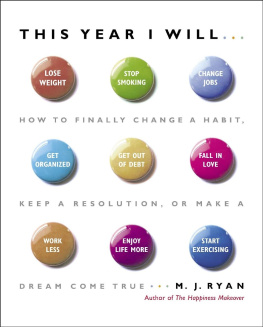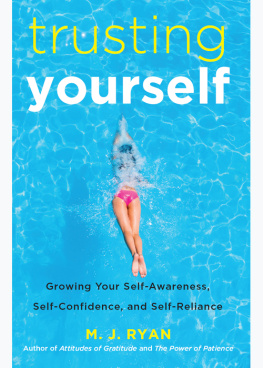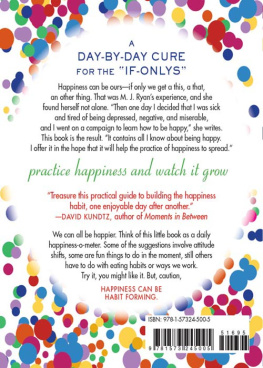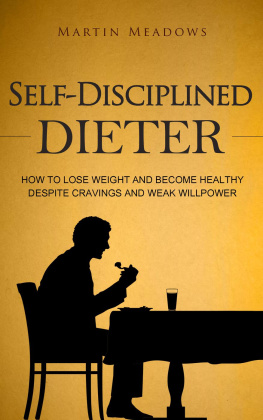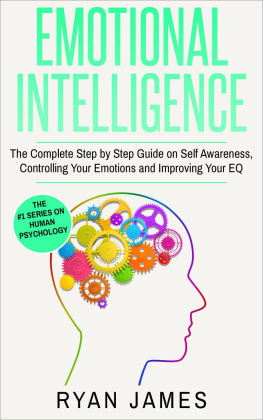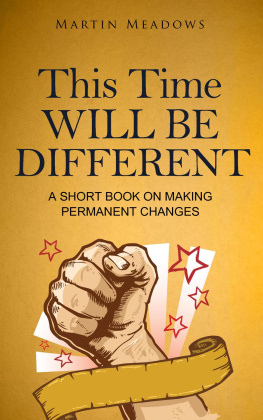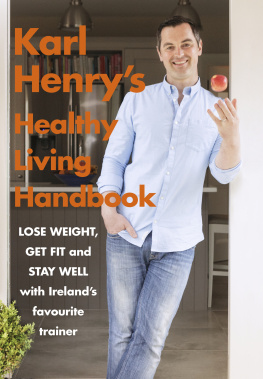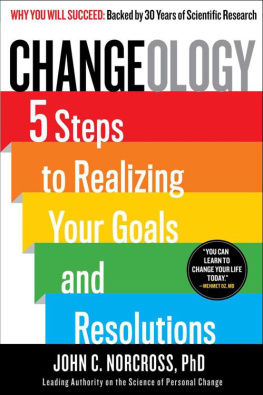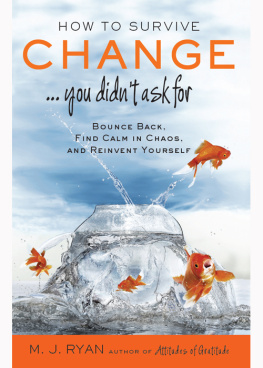Index
001
CONTENTS
THE ADVENTURE OF LIVING YOUR DREAMS
PREPARING TO CHANGE
You've Got to Really Want This
What Need Is Being Served by What You're Doing Now?
Get Your Three Brains on Your Side
Ambivalence Is Normal
What's the Price of Not Changing?
Run Toward, Not Away From
The Gap Between Where You Are and Where You Want to Be Is a Good Thing
No Time Is the Perfect Time to Begin
Imagine Your Future Positive Self
Understanding Is the Booby Prize
Believe You Can Do It
What If You've Been Down This Road Before?
You Can't Get Fit by Watching Others Exercise
GETTING INTO ACTION
Focus, People
Elevator Broken, Use the Stairs
Create a Huge Challenge for Yourself
Follow Your Formula for Success
Strongly Set Your Intention
Create a SMART Goal
Put Yourself Under Contract
Become a Tracker
What Kind of Support Do You Need?
It's Going to Feel Awkward at First
Yes, You Can Find the Time
When You Don't Know What to Do, Channel Someone Who Does
Oops, I Forgot
Make Backup Plans, Not Excuses
Use Your Imagination to Make It Easier
Don't Despair: Understand the Three Stages of Learning
Show Up, with Grit
Do a Postgame Review
AA Is on to SomethingOne Day at a Time
Practice Self-Appreciation Every Day
KEEPING GOING
How You Gonna Keep Up the Momentum?
What's Standing in Your Way?
Remember What Will Truly Make You Happy
Don't Let "Them" Bring You Down
Use Your ABCDEs on Those Nasty Voices in Your Head
The Imperfect Is Our Paradise
You Can't Change What You've Done, Only What You're Going to Do
SIFT When You Want to Give Up
Have a Little Fun with It, Will You?
Ask for Help from Invisible Hands
You Don't Have to Scarf Down the Whole Box Just Because You Ate One Cookie
Look at the Character Strengths You're Cultivating
Once You Create the New Habit, It's Yours for Life
The Old Pathway's Still There TooBeware of Stressors
When Blown off Course, Apply the Four As
TWELVE TIPS FOR KEEPING YOUR PROMISE TO YOURSELF
CONSCIOUS SELF-CREATION
Want More Support?
Acknowledgments
Backmatter
Copyright Information
002
THE ADVENTURE OF LIVING YOUR DREAMS
We are what we repeatedly do. Excellence, then, is not an act, but a habit.
ARISTOTLE
"This year, I'm going to stop worrying so much."
"I will get in shape, once and for all."
"I'll stop spending beyond my means."
"I'll get along better with my family."
"I'll start that business I've always dreamed about."
"I'll begin volunteering in my community."
"I'll finally learn Spanish."
How many of us have made a resolution similar to one of these? We all have something we want to change about ourselves or learn to do. Some of us want to lose weight, become more organized, or quit smoking. Others want to tackle the more existential longings: a sense of purpose, more work/life balance, the courage to leave an unfulfilling career and start over. Whether it's New Year's Day, an important birthday, after a divorce, or just because we're fed up, at some point we vow to do that one thing we've always wantedmake that one leap we are afraid of or give up the thing that plagues us. But by the time the rosy blush of good intentions wears off, the resolution gets pushed aside. Not because we don't still long to have what it is we really want; but because we just don't know how to change.
I believe that people can change. Not just superficially, or temporarily. I believe that we have the ability within us to truly rearrange our inner landscape and make changes happen within ourselves and our lives. This is the cornerstone of all the books I have written and all the work I do with my clients: the awareness that we can stop doing the things that hold us back or cause us suffering and create a life filled with meaning, peace, and ultimately, happiness. We can make a dream come true or bring something new into being. Big or small, grandiose or humble, we can have the things we want in life.
But it's not easy, as anyone who has tried to change a habit or do something new knows. Our brains create strong tendencies to do the same thing over and over. We say we're going to change, we may even do it for a little while, but soon we find ourselves back to our old habits.
To bring new behavior into being takes work. Our brains have enormous "plasticity," meaning they can create new cells and pathways. But it takes certain mental preparation, particular awarenesses and attitudes, and lots of practice to create a pathway to the new options (six to nine months, say many brain scientistsso much for those seven-day- wonder programs).
Change requires that we stretch not only mentally, but emotionally and spiritually. It takes energy, determination, and aspiration, the ability to intentionally bring into being something we want. It requires starting over when we blow it or get discouraged. We may be forced to question our assumptions about what we're capable of, or confront our deepest fears. An acquaintance starting his own Internet business once told me, "My whole life I've been afraid of looking like a fool, afraid I've got a sign on my back reading 'Idiot.' But to get my business going, I'll have to keep talking to people who say my idea will never work and believe enough in myself and my concept to keep moving forward." When you go toward what you want in your life, you may find yourself in similarly challenging places.
To top it all off, what works for one person doesn't necessarily apply to another, so the advice you get from magazines, books, and the Internet may not be particularly useful for you. The good news, however, is that once you learn your particular success formula, once you've cultivated new inner and outer emotional, mental, and spiritual resources, you can apply those to anything you want to cultivate in yourself.
Do you keep hoping that a magic fairy will appear to make your dreams come true? That if you just read enough issues of Shape those thunder thighs will disappear? You're not alone. Most of us are not concrete enough about what we want, are unrealistic about what we can reasonably ask ourselves to learn, and don't know how to track our progress.
Here's what a new client of mine said he wanted to learn in three months: "to be less nitpicky and fearful; to be more optimistic, to be more responsible and empathetic; to be more creative; to be more productive; to live a healthier life and to take better care of myself." "How about create world peace while you're at it?" I replied. "And what does 'more' mean anyway? Even if it were possible to focus on all of this in that time frame, how will you know if you are more of any of these things?"
As this client so touchingly demonstrated, we expect too much of ourselves and we expect to change overnight. When that doesn't happen, we resign ourselves to staying the same, convinced that we are hopeless, weak, or unmotivatedwhich makes us even more stuck. As another of my client, eager to lose weight, puts it, "Once I eat the first cookie, I figure I might as well go through the whole box."
Social scientists tell us that when we change a habit or follow a dream we go through five stages: precontemplation, when we don't even know we need or want to change; contemplation, when we say to ourselves, "someday I'll do that"; preparation, when we are getting ready to do it "soon"; action, as in "I'm starting right now"; and maintenance, which means we keep going until we get where we want and stay there.
I've structured the book around these stages, beginning with preparing to change. I'm not here to convince you that you should overcome a bad habit or learn something new. I'm assuming you've already figured that out or else you wouldn't be picking up this book. (Although at the beginning of "Preparing to Change," I do offer a couple ways to choose which goal to focus on now.)

